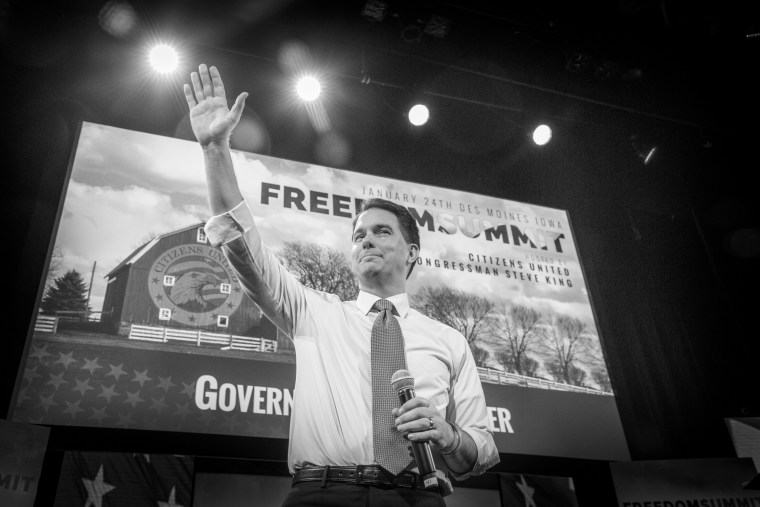With an eye on a potential 2016 presidential bid, Wisconsin Gov. Scott Walker on Tuesday evening delivered his state budget address – touting his ability to operate a lean government while also making significant cuts, including $300 million to the University of Wisconsin System over the next two years to address a shortfall.
Democrats this week criticized Walker’s $68 billion spending plan, arguing the state wouldn’t be facing a projected $2.2 billion deficit if it weren’t for Walker and the GOP-controlled legislature approving tax cuts of approximately $2 billion during the governor’s first term.
RELATED: Scott Walker leads Iowa poll
Walker, however, lauded property tax bills going down, saying a family in a typical home in Wisconsin will pay a bill that’s $131 less this year in comparison to 2010. “Just as I promised, property taxes by the end of 2016 will be lower than they were in 2014. That means lower property taxes for six years in a row,” he told the state legislature.
The governor hit on several national themes and flashes of policy that could reappear should he does make a bid for the nation’s highest office – including tightening the state’s financial belt, creating a government that is limited in scope but still effective and boasting about Wisconsin’s robust health coverage – something he said the state had done without Obamacare expansion.
During his speech, Walker struck a personal tone, speaking of his modest upbringing and working as a dishwasher and flipping burgers at McDonald’s to save for school. “More than anything, my family ingrained in me the idea that anyone who worked hard could go as far as their dreams would take them. It was through their eyes that I got my first glimpse of the American dream.” The governor said his budget plan “will help restore that American dream right here in Wisconsin.”
Besides the cuts to the school system, Walker pitched other controversial initiatives, including borrowing more than $1 billion for road projects and a plan to make drug tests for public aid recipients mandatory.
“Our budget expands the requirement for able-bodied adults to be enrolled in an employment and training program in order to receive food stamps. Now, some might claim that we're making it harder to get government assistance. We're not. We're making it easier to get a job,” Walker argued. He added, “The next step is to require able-bodied adults without children to pass a drug test in order to get a welfare check. For those who fail, we will provide treatment, so we can help them get off of drugs.”
Walker, 47, is generating 2016 buzz following a recent, standout appearance in the early voting state of Iowa and at an appearance at an event in Washington D.C. last week, Walker insisted Americans have a “craving for something new, something fresh and something dynamic.”
RELATED: Walker: Americans crave 'something new'
The governor's Jan. 13 state of the state address also had 2016 flickers. During those remarks, Walker said Wisconsin’s government can be county’s shining examplesand criticized those in Washington who “believe government should play a growing role in our lives and rarely question its expense.”
Walker inched closer to a potential 2016 run last week, announcing that he is setting up a committee called “Our American Revival” to help him fundraise should he decide to jump into the race.
Despite his high-profile battles with unions in 2011 and 2012, Walker doesn’t have the same national name recognition as a Jeb Bush, Chris Christie, Ted Cruz or Marco Rubio. That doesn’t mean Walker can’t win – but it does suggest he faces more of an uphill battle. Walker recently won re-election following a hard-fought race against Democrat Mary Burke, has grappled with an inquiry into his administration regarding alleged illegal fundraising and has faced criticism over his attempt to roll back union rights, surviving a recall election in 2012.
RELATED: Walker tiptoes closer to a presidential run
The Democratic National Committee released a statement criticizing Walker on the $2 billion deficit, “misplaced priorities on education” and for borrowing more than $1 billion, adding to the state’s debt.
“Instead of taking ‘bold steps’ to find a solution to his state’s budget crisis, Governor Walker would rather play political games, further polarize his state, and exacerbate an already dire budget situation,” said Jason Pitt, regional press secretary for the DNC. “No amount of spin will change the priorities of Walker’s proposed budget – cuts to education and vital services for the middle class, and more tax cuts for folks who don’t need them.”
